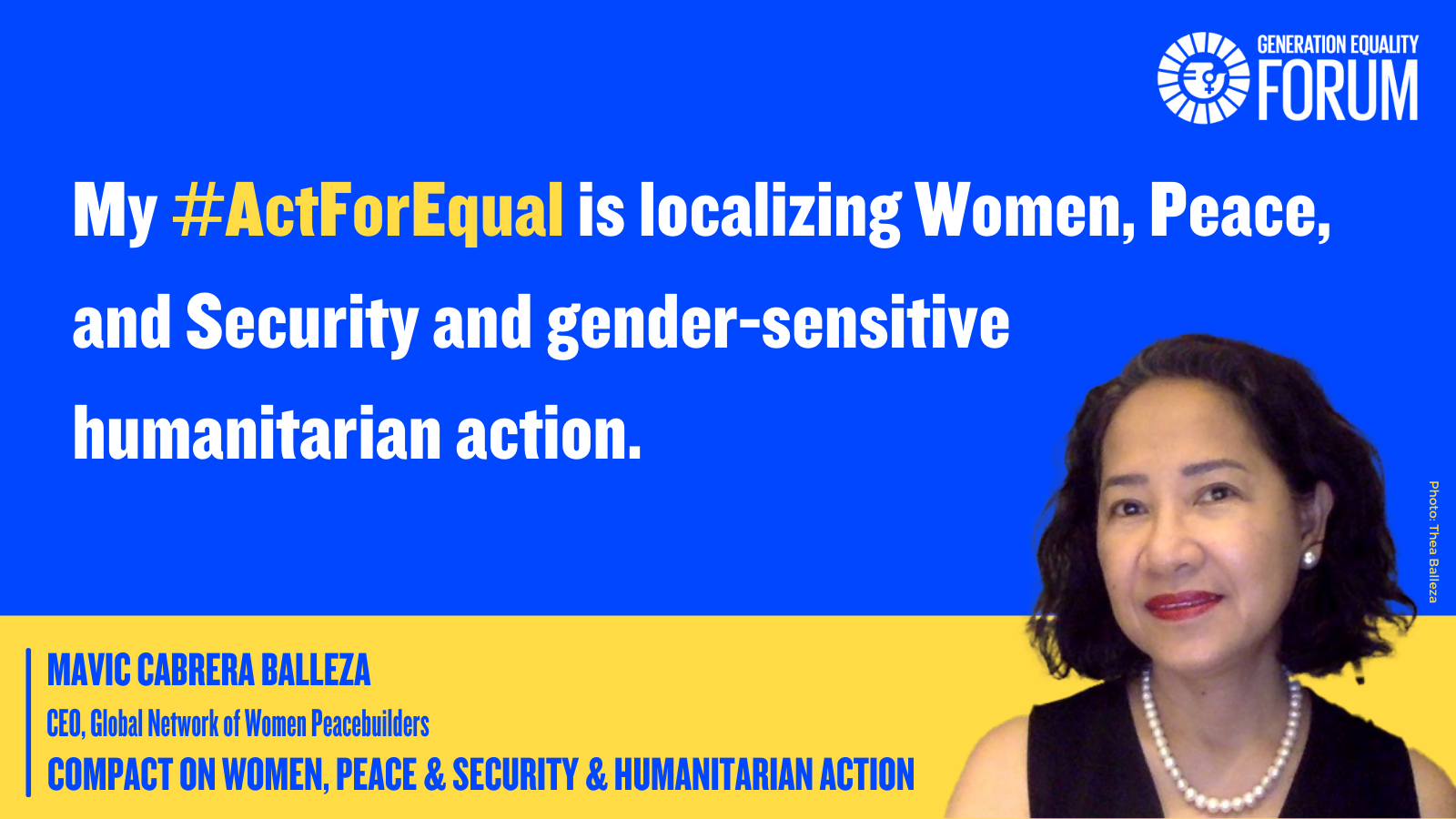
Mavic Cabrera Balleza
Compact on Women, Peace and Security and Humanitarian Action
Role and Organization: Founder and CEO, Global Network of Women Peacebuilders (GNWP)
What inspired your organization to become a Board Member of the Compact on Women, Peace and Security and Humanitarian Action?
We signed up to be a board member of the Compact because we are tired of increasing levels of conflict, insecurity for women and girls, and global military spending on the one hand, and endless commitments with no tangible impact, on the other. It is already twenty years since the landmark Security Council Resolution 1325 on Women, Peace and Security was passed, yet we have seen little progress and we are suffering from policy fatigue. We want everyone - Member States, the United Nations, regional organizations, the private sector, and the donor community - to acknowledge, value, and support civil society, including through funding. We want governments to guarantee our safety and protection as we work together to transform the commitments of the past decades into action. This is why the unique composition of the Compact is important. The broader representation of civil society, governments, the UN, and regional organizations will ensure a more inclusive and bolder yet realistic vision for the Compact throughout the coming five years.
What does success at the Generation Equality Forum look like to you?
Success at the Generation Equality forum is when we are able to translate gender equality from a concept or policy into reality. This will only be possible if all of us who are now active in the Generation Equality Forum will go out of our echo chambers, speak with the people on the street, in schools, in factories and offices, in groceries, in markets, in local communities, and explain what gender equality is about. Most of them will probably hear about gender equality for the first time, but that would be our first indicator of success. We should then follow up those initial conversations with more profound discussions and collective and transformative actions.
To make this happen, as Compact members and Action Coalition leaders, we need to ensure that women, young women, girls, and LGBTQI persons from around the world – including those living in conflict and crisis-affected situations – are meaningfully included in decision-making on the priority issues of the Generation Equality Forum. This is the only way to ensure that the outcomes of the Generation Equality Forum meet their urgent priorities and needs. This is the what success looks like to me.
What transformation is most urgently needed in the sphere of Women, Peace and Security and Humanitarian Action, and why?
We know that local women and young people have a profound understanding of their countries’ peace and security situation, gender and power relations, and humanitarian needs, because they live this reality every single day. However, we also know that they are not recognized as experts or acknowledged for what they can contribute to building solutions. As a result, there is no funding for these local actors to carry out the solutions they have developed.
We need local women and youth to be empowered to design and implement humanitarian responses and the commitments on Women, Peace and Security on their own. To facilitate this, experts need to transfer their skills and knowledge and share their resources so that local populations can lead their own initiatives. As the Compact, we need to honour the agency, commitment and passion of local communities and get Members States and the donor community to provide funding for local actors in a predictable and straightforward manner.
What action for gender equality would you like to see come out of the Compact?
One action I would like to see is for the Compact to ensure localization of all National Action Plans[1] on Women, Peace and Security – as well as use of localization as an implementation strategy even in countries, where there are no National Action Plans. This means that women and youth in local communities - in partnership with governors, mayors, indigenous leaders and other key local actors – develop a plan to implement national-level commitments on Women, Peace and Security locally. This process will ensure that implementation responds to the realities of local communities and the special needs of women and girls and other marginalized groups. When local populations are able to shape the implementation of the Women, Peace and Security agenda, it becomes inclusive, participatory, intersectional, and it fosters strong ownership. This is what we need to prioritize to effectively respond to the violent conflicts, the pandemic, and other humanitarian crises.
Read more about the Compact on Women, Peace and Security and Humanitarian Action here.
[1] National Action Plans are a practical document that detail the actions a government is taking to meet its obligations under the eight UN Security Council Women, Peace and Security resolutions, and other internationally agreed resolutions to ensure these commitments are translated into concrete policies and programmes.
